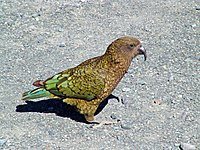parrot

.
he fauna of New Zealand evolved for a long time in arrots, for example, the adaptations to flightlessness of the kakapo and the ground breeding of the kea.[34] Polynesians arrived at Aotearoa between 800 and 1300 CE,[41] and introduced the kurī (dog) to the islands.[34] This was disastrous for the native fauna, because mammalian predators can locate prey by scent, and the native fauna had not evolved a defence against them
The kakapo was hunted for its meat, skin, and plumage. When the first European settlers arrived, the kakapo was already declining, but still widespread The large-scale clearance of forests and bush destroyed its habitat while introduced pred
The New Zealand kaka needs large tracts of forest to thrive, and the continued fragmentation of forests due to agriculture and logging has a devastating effect on this species. Another threat comes from competition with introduced species for food, for example with possums for the endemic mistletoe and rata and with wasps for shimmering honeydew, an excretion of scale insects. F
The kea nests in holes in the ground, again making it vulnerable to introduced predators. Another major threat, resulting from development of the alpine zone, is their opportunistic reliance on human food sources as their natural food sources dwindle
Conservation